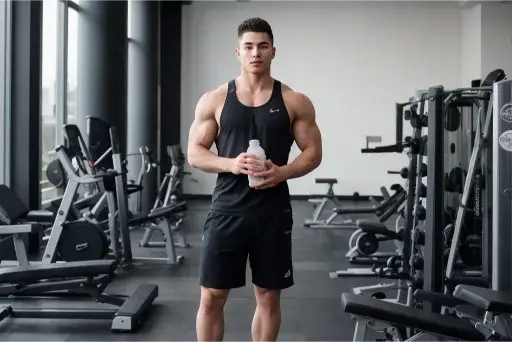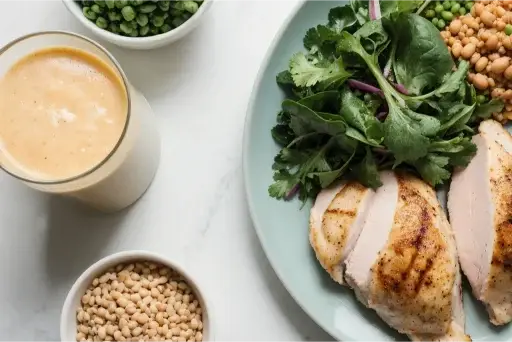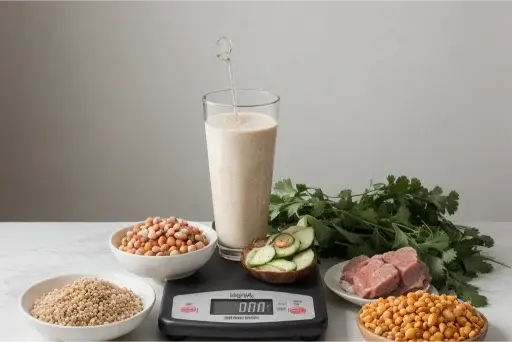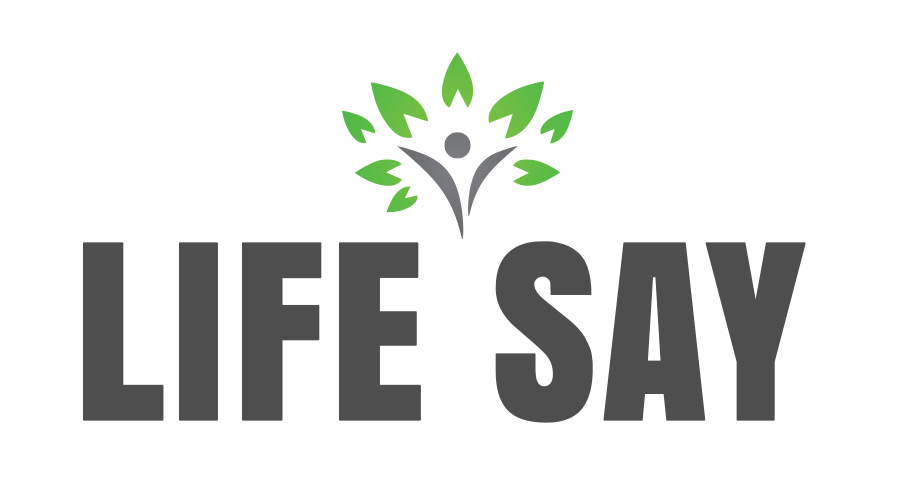Which is Better, Drinking Protein or Eating Protein?
Which is Better, Drinking Protein or Eating Protein: Protein is a fundamental nutrient, crucial for muscle repair, growth, and general health.
When it comes to nutrition, health enthusiasts and professionals often talk about whether protein should be consumed through whole foods or through drinks like shakes and supplements।
This topic not only garners interest among fitness enthusiasts and healthcare professionals but is also crucial for anyone looking to optimize their dietary habits for better health and wellness.
I am Dr. P. Kumar, MD in Preventive Medicine. Today, I will delve into the ongoing debate between consuming protein through shakes and supplements versus through whole foods.

Post-Workout Protein
Table of Contents
- Which is Better, Drinking Protein or Eating Protein?
- Drinking Protein: Shakes and Supplement
- Eating Protein: Whole Food Sources
- Conclusion: Balancing Convenience with Nutritional Quality
- Frequently asked questions:
1. Drinking Protein: Shakes and Supplement

Protein Choices
Pros:
- Fast Absorption:Whey or plant-based protein shakes are quickly absorbed by the body. This makes them especially beneficial for post-workout recovery, aiding in swift muscle repair and growth.
- According to a study by Tang, J.E., whey protein hydrolysate significantly enhances muscle protein synthesis post-exercise, making it more effective than other protein types.
- Convenience:Protein shakes are easy to prepare and perfect for on-the-go consumption, appealing to those with hectic schedules.
Cons:
- Nutrient Limitation:Although shakes can be enriched with vitamins and minerals, they generally lack the diverse nutrients present in whole foods, such as fiber and antioxidants.
- Satiety Concerns:Liquid calories are less filling than solid food, which might lead to increased hunger and higher calorie intake later.
- Research by Mattes & Campbellhas found that solid foods are more satiating than liquids, which can help prevent the increased hunger and higher calorie intake that may occur later in the day after consuming liquid calories..
2. Eating Protein: Whole Food Sources

Healthy Meal Preparation
Pros:
- Nutritional Diversity:Foods like lean meats, fish, legumes, and dairy not only provide protein but also a wide array of essential nutrients, promoting a balanced diet.
- Increased Satiety:Solid foods help control appetite and reduce calorie intake, beneficial for weight management.
- In a study by Weigle, it was demonstrated that high-protein diets lead to sustained reductions in appetite and calorie intake, as well as weight loss, making solid foods a beneficial choice for weight management.
Cons:
- Preparation Time:Unlike shakes, whole foods require more time for shopping, preparation, and cooking, which may not be feasible for everyone.
- Digestion Speed:Solid protein sources digest slower than protein shakes, which might not be ideal for immediate recovery needs post-exercise.
Do not miss our this research backed health blog: 10+ Wellhealth Ayurvedic Health Tips
Conclusion: Balancing Convenience with Nutritional Quality

Drinking Protein or Eating Protein
The choice between drinking protein and eating protein depends on individual health goals, preferences, and lifestyle.
Protein shakes provide a quick, convenient source ideal for muscle building and speedy recovery post-exercise. On the other hand, whole foods offer greater nutritional benefits and are key for overall health and weight management.
As we advance through 2024, integrating both protein shakes and whole foods into your diet could be an effective strategy.
Phillips, S. M., & Van Loon, L. J. C. (2011). Dietary protein for athletes: From requirements to optimum adaptation. Journal of Sports Sciences, 29(sup1), S29–S38. https://doi.org/10.1080/02640414.2011.619204
This approach supports muscle repair and growth while ensuring a comprehensive intake of various nutrients essential for optimal health. Adopting a flexible diet that includes both forms of protein can help maintain balance between a busy lifestyle and achieving fitness and health goals.
To help you better understand how to integrate protein into your diet, here are some frequently asked questions:
1. Can I rely solely on protein shakes for my daily protein intake?
While protein shakes can supplement your diet, relying on them exclusively is not recommended. Whole foods offer a variety of essential nutrients, including fiber, vitamins, and minerals, that shakes might lack. It’s best to get most of your protein from whole food sources. [1]
2. How quickly should I consume protein after a workout?
For optimal recovery and muscle synthesis, it’s beneficial to consume protein within a 30-minute to 2-hour window after exercising. Protein shakes are convenient for immediate post-workout consumption due to their quick absorption. [2]
3. Are plant-based proteins as effective as animal-based proteins?
Yes, plant-based proteins can be as effective as animal-based proteins for muscle building and repair, especially when a variety of plant sources are consumed to ensure all essential amino acids are ingested. [3]
4. How much protein do I need daily?
Daily protein needs vary depending on several factors, including age, sex, physical activity level, and health goals. As a general guideline, the Dietary Reference Intake (DRI) is 0.8 grams of protein per kilogram of body weight for the average adult. [4]
5. Do protein shakes cause weight gain?
Protein shakes can contribute to weight gain if they lead to a surplus in daily calorie intake. However, when used as part of a balanced diet and exercise regimen, they can support muscle growth without unnecessary weight gain. [5]
6. Is it better to drink a protein shake before or after a workout?
Consuming protein after a workout is generally recommended for muscle recovery and growth. However, consuming protein before a workout can also have benefits, especially for providing the energy necessary for a strenuous workout. [6]
7. Can eating too much protein be harmful?
Excessive protein intake, especially from supplements, can strain the kidneys over time and may lead to dehydration and other health issues in susceptible individuals. It’s important to consume protein in moderation and balance it with other nutrients. [7]
8. What are some high-protein whole food options?
High-protein whole food options include lean meats (chicken, turkey, beef), fish, eggs, dairy products (milk, cheese, yogurt), legumes (beans, lentils), and nuts and seeds. [8]
9. How can vegetarians and vegans meet their protein needs?
Vegetarians and vegans can meet their protein needs by consuming a variety of plant-based protein sources, including legumes, tofu, tempeh, seitan, nuts, seeds, and whole grains, to ensure they get all essential amino acids. [9]
10. Do I need to use protein supplements to build muscle?
No, protein supplements are not necessary to build muscle. A well-planned diet that includes sufficient protein from whole food sources can meet your needs. Supplements can be convenient but should not replace whole foods. [10]
11. What are some good sources of protein?
Meat, eggs, milk products, pulses, soy products, and nuts are good sources of protein.

